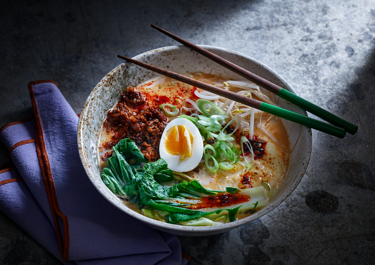
Tantanmen ramen

Instructions
Meat
Toppings and accompaniments
Soup
Tsuyu and tare
To serve
Simmer pork to perfection
To get the best pork, start by browning it evenly over medium heat to lock in the flavours. Add additional ingredients and leave to simmer. Patience is key; let it simmer until most of the liquid evaporates, intensifying the flavours without drying out the meat. Stir occasionally to make sure the pork stays tender and moist. This slow-cooking method infuses the pork with rich umami flavours that enhance the spicy broth without overpowering it.
Choosing the best bowl for tantanmen ramen
For the best eating experience, choose a deep and wide bowl. A bowl with a 1200–1400 ml capacity works well, but ideally, it should also be slightly shallow. The shape allows for easy mixing of the ingredients, ensuring the broth coats the noodles evenly. A wider bowl also cools the ramen just enough for comfortable eating without losing too much heat, creating a visually appealing and practical dining experience.
Master the noodles
Pay attention to timing to get the noodles right. Cook the noodles al dente, making sure they are firm with a slight bite. Thoroughly drain them to prevent excess water from diluting the broth. Placing the noodles in the bowl with hot broth right after cooking lets them absorb the soup flavours. Serve the ramen immediately to prevent the noodles from becoming too soft so every bite stays delicious.
Questions about tantanmen ramen
Unlock the complexities of tantanmen ramen with our questions and answers. Dive in below to discover how to get it just right.
Ingredients
Meat
Garlic cloves | 4 |
|---|---|
Fresh ginger | 25 g |
Minced pork | 200 g |
Doubanjiang beans and chilli paste | 3 tbsp |
Shaoxing wine or sake | 4 tbsp |
Salt and pepper to taste |
Toppings and accompaniments
Water for boiling | |
|---|---|
Eggs | 2 |
Instant Noodles packs | 4 |
Bok choy | 1 |
Bean sprouts | 400 ml |
Spring onions | 2 |
Havarti cheese / white cheddar | 4 slices |
Soup
Water | 1200 ml |
|---|---|
| 400 ml | |
Chicken broth cubes | 4 |
Butter | 1 tbsp |
Tsuyu
Japanese soya sauce | 2 tbsp |
|---|---|
Water | 6 tbsp |
Dashi broth | 10 g |
Mirin | 2 tbsp |
Tare
Light tahini | 4 tbsp |
|---|---|
Crispy chillies oil | 4 tbsp |
Try this simplified version of tantanmen ramen
This simplified version of tantanmen ramen offers all the bold flavours you love with a few easy shortcuts. Instant noodles and broth cubes speed up the process, while a mix of tahini and chilli oil brings depth to the seasoning. Cheese gives a unique, creamy touch that pairs surprisingly well with the spicy broth. With tender pak choi and savoury minced pork, this quick take on the traditional recipe is both satisfying and easy to make without losing its signature richness.
Deep flavours and enticing textures
This dish is all about the intricate dance between flavours and texture. The Doubanjiang bean paste adds a fiery, fermented spiciness that forms the backbone of the broth, while ginger and garlic offer aromatic depth, giving the ramen a warm complexity. The butter and milk contribute a creamy richness, softening the heat and adding a velvety texture to the broth.
Each topping introduces its own element to the overall textures. Pak choi adds a refreshing crispness, contrasting with the softness of the noodles, while bean sprouts bring a light, crunchy freshness. Tender minced pork delivers a savoury umami punch that enhances the creaminess of the broth, while cheese and slightly soft eggs add a richness that balances the spicy broth and crunchy toppings, so you get layers of both flavour and texture, making each spoonful delightfully indulgent.
Serve a colourful bowl for lunch or dinner
Tantanmen ramen is a versatile noodle soup that works just as well for lunch as dinner. For a lighter lunch, serve smaller portions with a generous amount of fresh toppings such as pak choi, bean sprouts, and spring onions. The bright colours and fresh textures keep the soup vibrant yet satisfying, perfect for lunchtime.
For dinner, go for a more substantial portion, allowing the creamy, rich broth to take centre stage. Serve in wide, deep bowls to ensure the broth fully covers the noodles and toppings. Whether served casually or as part of a more formal dinner, this ramen is sure to impress with its striking presentation and bold flavours, offering a satisfying and comforting experience any time of day.
Soups are an excellent choice for lunch and dinner, and we have a wide selection in our repertoire, including cucumber soup, goulash soup, mushroom ravioli soup, cheese soup with croutons, and vegetable soup with potato peel crisps.
Feel free to experiment with the recipe
You can easily experiment with the soup base, toppings, and fillings. Adjust the spice level by adding more or less Doubanjiang paste or crispy chilli oil, or add Sichuan peppercorns for an authentic, mouth-tingling heat. For a richer broth, add extra butter, replace the chicken broth with miso, or experiment with unsweetened soy milk for a smoother, creamier texture reminiscent of traditional tantanmen ramen.
Swap the minced pork for minced beef, chicken, prawns, or even sautéed tofu or mushrooms. These alternatives absorb the seasonings just as well as the original minced pork, keeping the soup irresistibly flavourful.
Explore new textures with toppings such as roasted seaweed or sesame seeds, which provide a nutty crunch that pairs well with the tahini in the tare. Switch the noodles for udon or soba to change the texture, and try a dash of vinegar for acidity or sesame oil for a richer finish.




&format=webp)





&format=webp)
